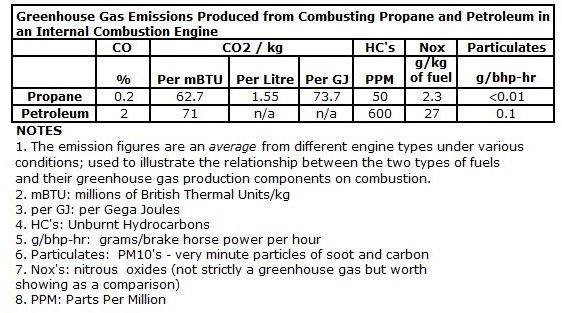Is Propane a Greenhouse Gas? Testing Propane for Greenhouse Gases
Introduction: Is Propane a Greenhouse Gas?
Propane is not considered to be a greenhouse gas in its original form even though it is a hydrocarbon. However, there are a certain amount of greenhouse gas emissions from propane during processing and combustion.
It is the third most used fuel for internal combustion engines, having other numerous applications beside this in the domestic sector.
Automobiles require modifications to their engines before using propane, the liquid fuel being stored in a steel tank located in the trunk of the car.
There are also many manufacturers producing various modes of transport, and industrial trucks being purpose built to run on propane, and these are becoming increasingly popular worldwide.
This is an article on the widespread use of propane and examines some of the factors on its production of greenhouse gases in its original state and during combustion. We begin by having a look at its processing and constituents.
Processing of Propane and its Resultant Constituents
Propane is a product from two sources: natural gas and crude oil.
It is extracted from natural gas during processing by a combination of pressure increase and temperature reduction that separates out the propane. This is due to the much lower boiling point of propane (-44ᴼF), than ethane (-144ᴼF), the other major component. Butane can also be drawn off the natural gas at this stage.
Propane is also a by-product of crude oil processing, carried out in an oil refinery, however this is normally used as process gas in the plant.
Below are constituents of propane (C3H8) and when combusted with 5 atoms of oxygen produce the following:
- C3H8 + 5O2 = 3CO2 + 4H2O
Because the air containing the oxygen required for combustion also contains nitrogen, NOx’s will be produced along with CO; a direct product of incomplete combustion.
Emissions from Combustion of Propane, Compared with Petroleum
In its natural state Propane does not produce any greenhouse gasses, however upstream processing does produce some greenhouse gasses, but much less than that of gasoline and diesel processing.
In the scale of hydrocarbon emissions from combustion, propane is much cleaner than petroleum and diesel fuel when used in an internal combustion engine.
There have been numerous tests and research projects carried out on various propane fuelled devices for calculating greenhouse gas emissions from propane. Below are summarized emissions from an internal combustion engine using propane compared to using petroleum:
- A 25% reduction in CO2
- A reduction of 70 – 90% of Carbon monoxide emissions (CO)
- A reduction of 50-75% unburnt hydrocarbons (HC)
- 35-60% fewer toxic emissions(NOx’s)
- Significantly less emissions of carcinogenic emissions.
- Insignificant emissions of particulates.
I have produced a table from various sources comparing greenhouse gas emissions from propane and petroleum, and this can be accessed from the Image Section at the end of the article.
Reference Webs:
- webcache - Propane emissions expressed as a percentage of petroleum emissions.
- propanecouncil - testing of propane.
- mecca - emissions from propane and petroleum.
Advantages and Disadvantages of Using Propane in an Internal Combustion Engines
The advantages of using propane, as opposed to gasoline and diesel fuels.
- Propane is a cleaner burning fuel emitting fewer greenhouse gasses.
- Propane is not a greenhouse gas in its natural state.
- Propane has higher octane rating reducing the tendency of knocking, evident in some petroleum/diesel engines.
- Propane is much cheaper to purchase than gasoline or diesel.
- Propane is nontoxic and not detrimental to soil or water if accidentally spilled.
The disadvantages of using propane as opposed to petroleum and diesel fuels.
- Distribution networks are still not located in sufficient areas of the country where consumers can refill their tanks.
- Although it has a higher octane rating, propane contains less energy leading to about a 5% reduction in power output, returning a lower fuel economy.
- Some filling stations require the propane to be issued by a qualified attendant, leading to queues.
- All propane tanks require a regular inspection and certification by a certified engineer.
- Not all garages have mechanics qualified in servicing propane fuelled vehicles.
- Public perception of carrying high-pressure compressed liquefied gas in the trunk of the vehicle is still negative.
- There has been no purpose built propane - fuelled vehicles in USA since 2004.
Reference Webs:
- fueleconomy - advantages and disadvantages of using propane
- propanecouncil - propane advantages
- webcache - potential and barriers of propane use
